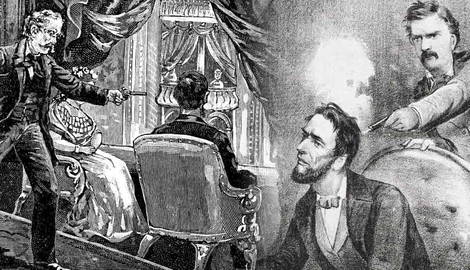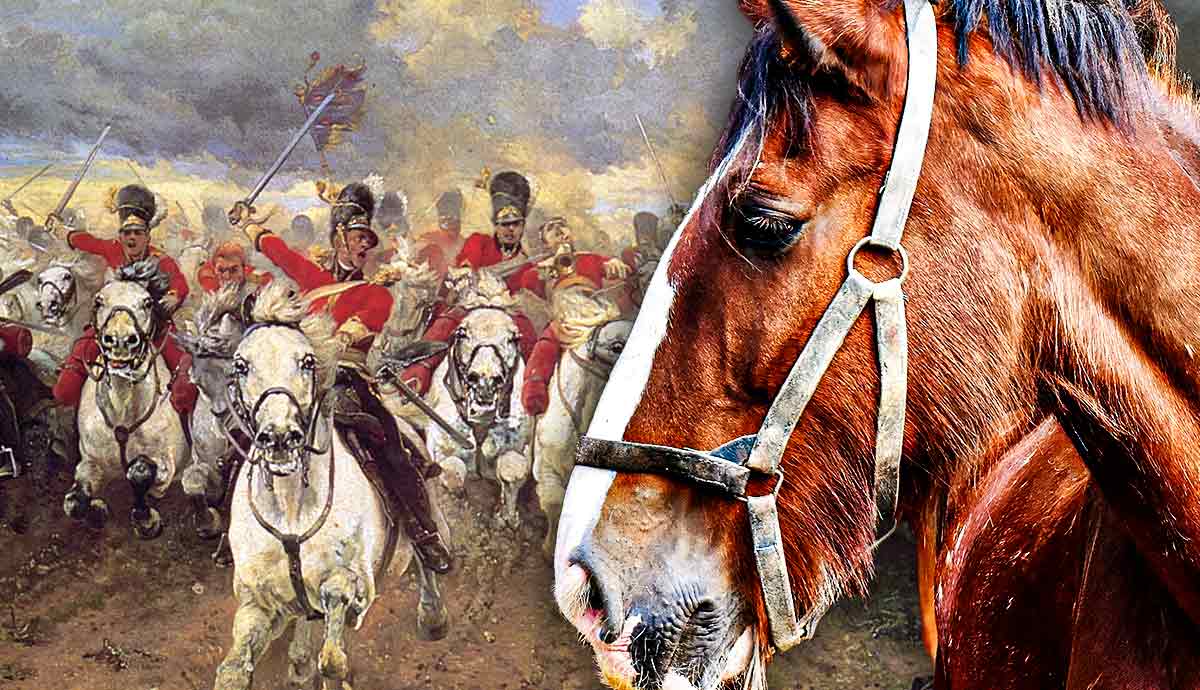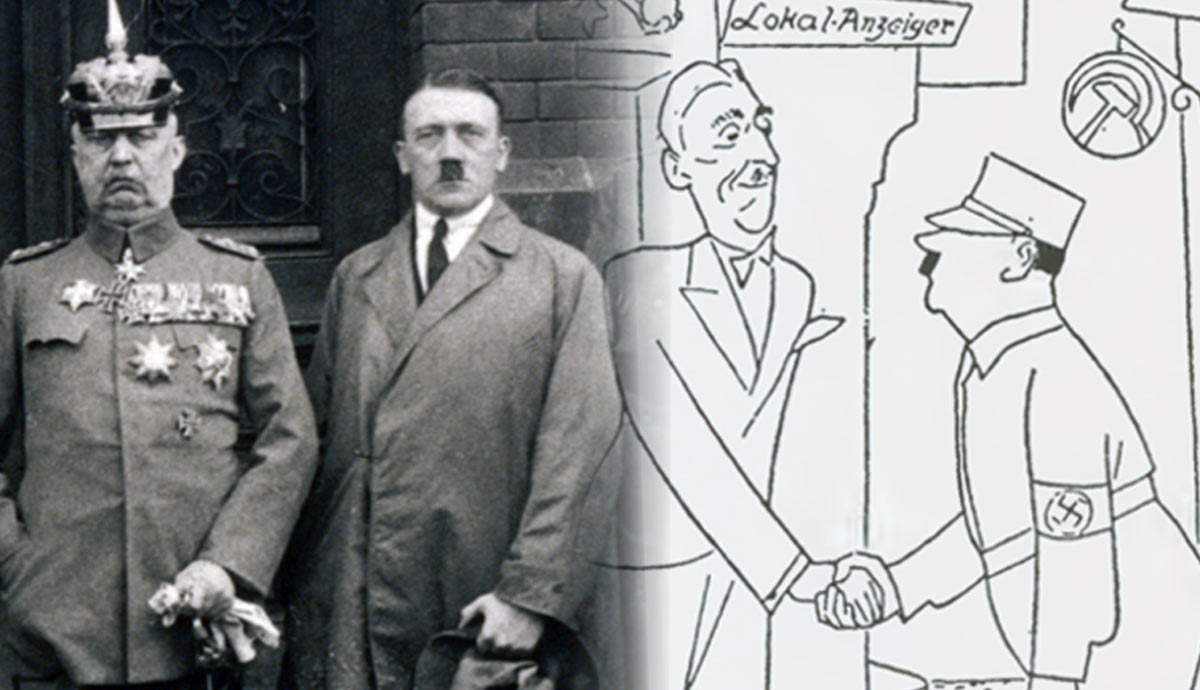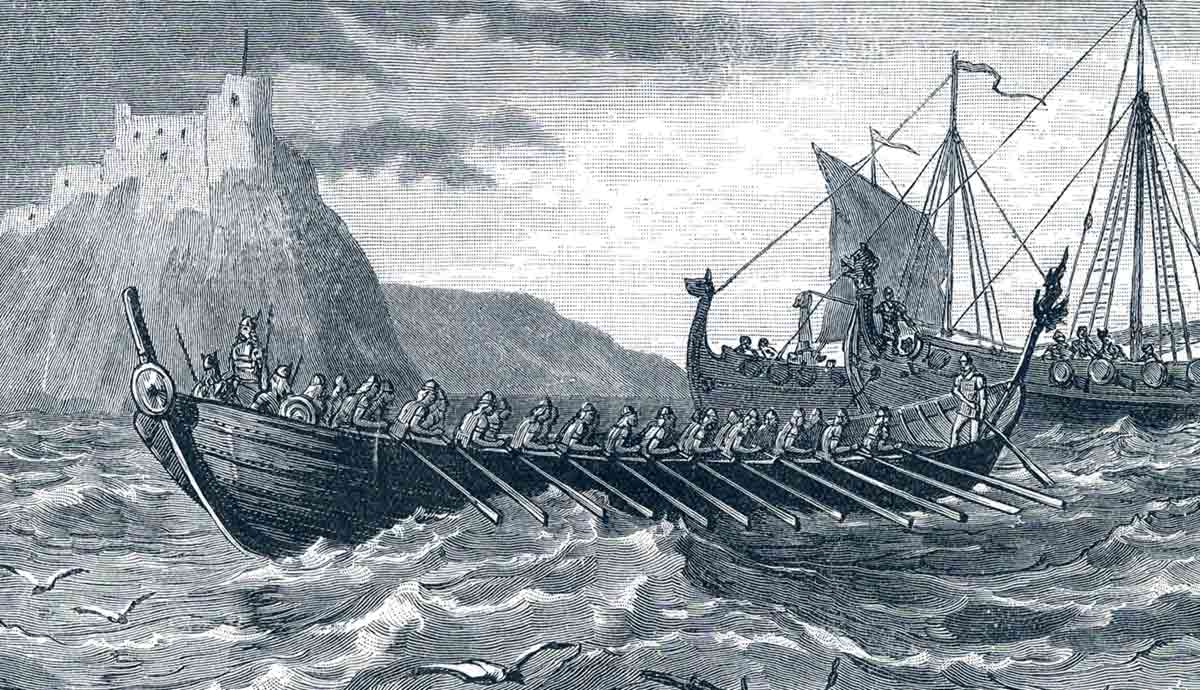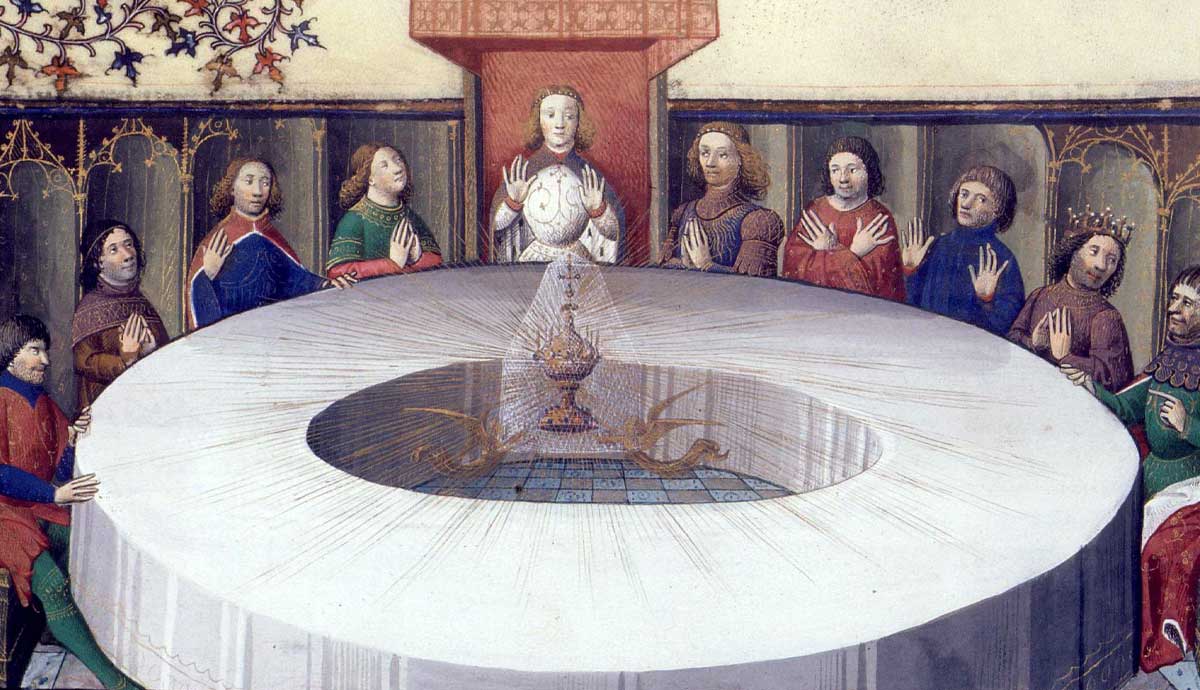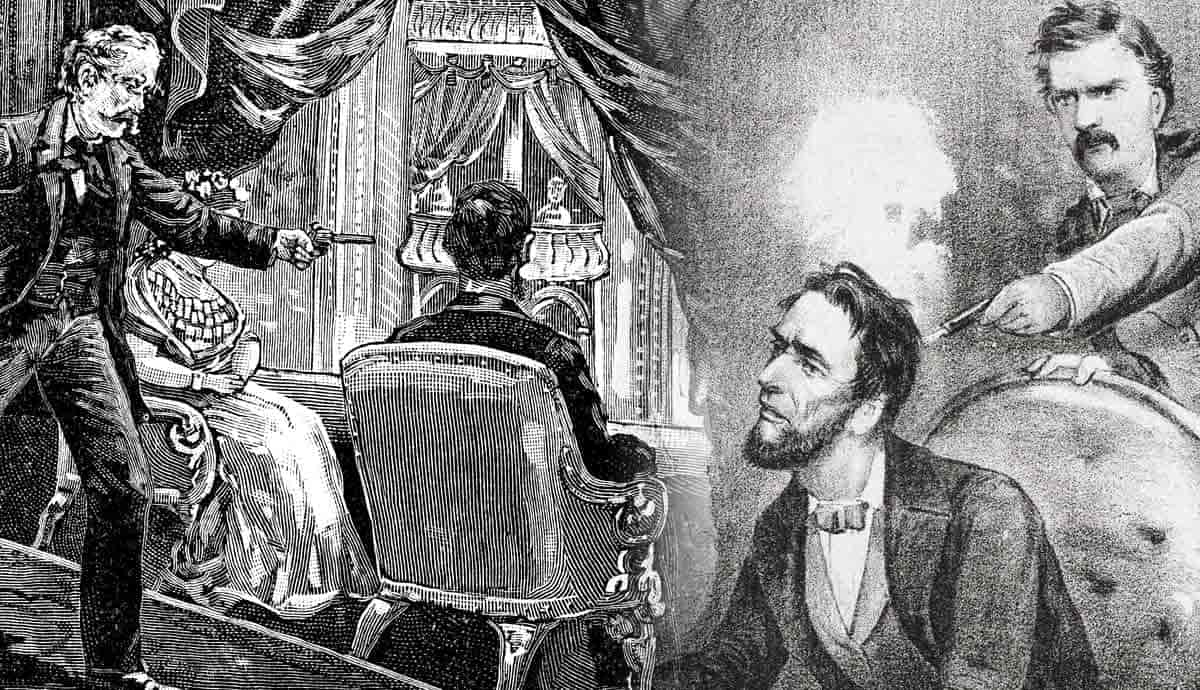
On the evening of April 14, 1865, Abraham Lincoln sat in a booth in Ford’s Theatre in Washington DC, watching a satirical play called Our American Cousin. He was with his wife, Mary, and two friends.
While enjoying the spectacle, Confederate sympathizer John Wilkes Booth walked up behind the president and leveled a pistol at the back of his head.
What happened next sent shockwaves through the country, completely eradicating the jubilation of Northern victory in the Civil War, which had ended just five days prior.
Who Was John Wilkes Booth?

Born into a family of stage actors, John Wilkes Booth became nationally famous in his own right. He was well known on the stage, not just for his presence, but for being an outspoken Confederate sympathizer and critic of Abraham Lincoln’s policies.
Lincoln had seen Booth on stage, and it was said that he admired the actor. The admiration, however, was not reciprocated. Booth planned to kidnap Lincoln. The driving force behind this was the opposing political viewpoints of each man. Lincoln was the Great Emancipator, a liberator of slaves, while Booth was a zealous crusader for the Confederacy and fully supported the idea of slavery.

In 1860, he became a member of the Knights of the Golden Circle, a paramilitary organization that wished to create a separate country encompassing the Southern United States, Central America, and the Caribbean. Members of this organization wanted to secede from the Union and expand slavery. However, it was dissolved in 1863 before the Civil War had even come to a conclusion.
Booth, however, still aided the Confederacy. A major factor in the Civil War was the Union’s superiority in manpower. When Union General Ulysses S. Grant decided to end prisoner exchanges in a bid to put further pressure on the Confederate manpower shortage, Booth recruited supporters and devised a plan to strike back at the Union. His accomplices would be six other men: Lewis Powell (also referred to as Lewis Payne), Samuel Arnold, Michael O’Laughlen, George Atzerodt, John Surratt, and David Herold.
Booth Plans Lincoln’s Assassination

In early 1865, Booth was already starting to plan the downfall of Abraham Lincoln. He attended Lincoln’s second inauguration on March 4, 1865, and wrote in his diary that he had missed a good opportunity to kill the president on that day. The plan at this stage, however, was not to kill the president but to kidnap him and take him to Richmond, Virginia, where he would be held with the intent of forcing the Union to release Confederate prisoners.

Thirteen days later, Booth and his accomplices made plans to kidnap Lincoln as he returned from a play at Campbell General Hospital. Lincoln did not go to the play but went to the National Hotel instead, which was where Booth was staying at the time. Had Booth not headed out to Campbell General Hospital, he may have been able to abduct his target at the hotel.
On April 9, the Confederates surrendered, and on April 11, Lincoln gave a speech in which he promoted the idea of complete emancipation of slaves, as well as voting rights to all men, including formerly enslaved men. Booth and Powell were in the crowd, and Booth became so emotionally charged that he ordered Powell to draw his gun and kill Lincoln on the spot. Powell refused, and Booth swore that he would kill Lincoln. Booth was quoted as saying, “That is the last speech he will ever give!”
Lincoln’s Eerie Premonition

Several days before his untimely death, Lincoln reportedly had a dream that acted as an ill portent. He related his experience to his friend and bodyguard, Ward Hill Lamon.
“About ten days ago, I retired very late. I had been up waiting for important dispatches from the front. I could not have been long in bed when I fell into a slumber, for I was weary. I soon began to dream. There seemed to be a death-like stillness about me. Then I heard subdued sobs, as if a number of people were weeping. I thought I left my bed and wandered downstairs. There the silence was broken by the same pitiful sobbing, but the mourners were invisible. I went from room to room; no living person was in sight, but the same mournful sounds of distress met me as I passed along. I saw light in all the rooms; every object was familiar to me; but where were all the people who were grieving as if their hearts would break? I was puzzled and alarmed. What could be the meaning of all this? Determined to find the cause of a state of things so mysterious and so shocking, I kept on until I arrived at the East Room, which I entered. There I met with a sickening surprise. Before me was a catafalque, on which rested a corpse wrapped in funeral vestments. Around it were stationed soldiers who were acting as guards; and there was a throng of people, gazing mournfully upon the corpse, whose face was covered, others weeping pitifully. ‘Who is dead in the White House?’ I demanded of one of the soldiers, ‘The President,’ was his answer; ‘he was killed by an assassin.’ Then came a loud burst of grief from the crowd, which woke me from my dream. I slept no more that night; and although it was only a dream, I have been strangely annoyed by it ever since.”
Lincoln also told his wife, Mary, about the dream. Lincoln was so shocked by this nightmarish omen that upon seeing his son, Tad, playing with a toy revolver, he suggested that it be put away for the time being.
The Assassination

The morning of April 14 was a beautiful Spring Day in Washington DC. Abraham took Mary out on a carriage ride of the city. They spoke of their wishes for the future. Mary wanted to visit the capitals of Europe, and Abraham wanted to see the gold mines of California.
That same morning, John Wilkes Booth stopped by Ford’s Theatre to pick up his mail. While there, he learned that Lincoln was to attend the performance of Our American Cousin that very evening. He then went to John Surratt’s mother’s house/tavern, where he had stashed his weapons, and called for a meeting of his conspirators. Mary Surratt was well aware of the conspiratorial nature of the meetings.
Booth had hoped that Ulysses S. Grant would also be at the theater that night, but Grant had declined the invitation as his wife did not get along well with Lincoln’s wife.
Booth gave orders to his accomplices. There were to be multiple assassinations that night. George Atzerodt was to go to a hotel called the Kirkwood House and assassinate Vice President Andrew Johnson. The plan had gone from kidnapping to murder very quickly, and Azerodt protested this decision. Booth, however, convinced Azerodt to go through with the plan.
The next target was Secretary of State William Seward. Lewis Powell was to go to Seward’s home and kill him there. All three attacks were planned to occur just after ten o’clock in the evening.

Abraham and Mary arrived at Ford’s Theatre at 8:30 pm. The show had already started and was stopped so the audience could greet their president. The Lincolns were in the company of 28-year-old Major Henry Rathbone and his fiancée, Clara Harris. A police officer, John Parker, was with the president because Ward Hill Lamon, Lincoln’s usual bodyguard, was unavailable that evening.
John Parker had a checkered past in the police force and had been disciplined for many infractions. It was not surprising then that when he discovered that from his seat near Lincoln, he could not see the stage, he moved to a better seat, leaving the presence of the president. At intermission, he went across the road to have a drink at a saloon where John Wilkes Booth, coincidentally, was waiting.

With Parker still at the saloon, Booth made his way into Ford’s Theatre and proceeded to enter the president’s booth. After entering, he wedged the door shut with a stick and proceeded to the next door behind, which was his target. Booth, a stage actor, knew the play well and waited for the right moment. There was always laughter when a specific line was delivered. As the audience erupted into laughter, Booth opened the door, held his Derringer pistol several inches from the back of Abraham Lincoln’s head, and pulled the trigger.
Rathbone jumped from his seat and struggled with Booth, but Booth dropped his pistol, pulled a dagger, and slashed Rathbone on the arm. Rathbone forced Booth to the railing whereupon Booth jumped over and landed awkwardly on the stage before holding his bloodied knife in the air.
What he shouted is a point of debate. Traditionally, it is thought that he shouted, “sic semper tyrannis!”—“Thus always to tyrants,” the state motto of Virginia. However, other accounts had him shouting, “The South is avenged!” and similar statements. Some accounts also leave this part out completely.

Amid the screams of Clara Harris and Mary Todd, Booth made his escape, chased by Major Joseph B. Stewart, who leaped through the orchestra pit and onto the stage.
By this time, the audience was realizing exactly what had happened. Clara Harris was calling for water, and the stage filled with officers, policemen, actors, and audience members, trying to figure out what was happening and, at the same time, trying to avert chaos. Some thought the building was on fire or that the Confederates had taken the city. It soon became clear, however, that the president had been shot, and the man who ran across the stage was the assassin.
In the audience, Doctor Charles Leale rushed to the president’s aid, where he found the bullet had entered Lincoln’s head through the back of his left ear and came to a stop behind his right eye.
The Other Assassination Attempts

Meanwhile, Lewis Powell and David Herold went to the home of William Seward to carry out their own assassination attempt. Herold sat at the reins of the getaway carriage while Powell went to the front door, pretending to have a prescription for Seward, who was in bed recovering from a carriage accident.
He was denied entry by Seward’s servant, as well as by Seward’s son, Augustus. Powell fought his way in, knocking Augustus unconscious with the butt of his revolver. Augustus also suffered seven stab wounds.
Powell also fought Seward’s bodyguard and managed to get past him to the bedroom where the Secretary of State lay. Powell slashed his throat and stabbed him several times before he managed to make his escape. A jaw splint Seward was wearing likely saved his life by deflecting the blade.
To Powell’s dismay, Herold had already taken off with the carriage. Nevertheless, Powell managed to escape across the Potomac and into Maryland, where he met up with John Wilkes Booth. They then went to hide out in Mary Surratt’s tavern.

Atzerodt, who had been tasked with killing Andrew Johnson, ultimately failed. He went to the Kirkwood House where Johnson was staying, but when it came time to commit the murder, Atzerodt went to the bar downstairs instead and proceeded to get drunk. As he stumbled home, he tossed his weapons into a ditch.
Although Seward was seriously injured, he recovered from his wounds and continued to serve in government for a few more years before retiring. He died in 1872 at the age of 71.
Lincoln’s Death

As far as can be ascertained, Lincoln did not suffer, although he was alive a good nine hours after the shooting. He was taken to a nearby house where he was looked after by doctors. It was apparent, however, that nothing could be done for him. He was unconscious the entire time.
His breathing became shallower, but there were no struggling or death rattles. He quietly slipped away at 7:22 on the morning of April 15. Upon his face was a look of serenity.
Between 10 and 11 that morning, Andrew Johnson took the Oath of Office and was sworn in as the 17th president of the United States.
Manhunt

After meeting up, Herold and Booth proceeded to Doctor Samuel Mudd’s house. Booth had broken his leg when he jumped from the presidential booth to the stage. Mudd made a splint for the leg and supplied Booth with crutches.
The two outlaws made their way further south and into hiding. The manhunt that followed was one of the largest in US history.
They were eventually discovered hiding in a barn. Police surrounded the building. Herold surrendered, but Booth came out firing. He was mortally wounded and died a few hours later.
All other conspirators, with the exception of John Surratt, were apprehended by the end of the month. Surratt fled the country but was eventually captured by a US agent in 1866 in Egypt.
Most of the conspirators were put on trial and sentenced to prison or hanged. Mary Surratt, John’s mother, was the first woman executed by the United States government. The others sentenced to be hanged were Powell, Herold, and Atzerodt. Mary’s son was released after the jury failed to reach a verdict.
After the relief of an end to a war that had ripped the nation apart, the future of the United States looked bright for most. This feeling of victory was soon tempered by the tragedy of Lincoln’s assassination. It shocked the country and prematurely ended the life of a great man who had given his all in the quest for justice across the country.
